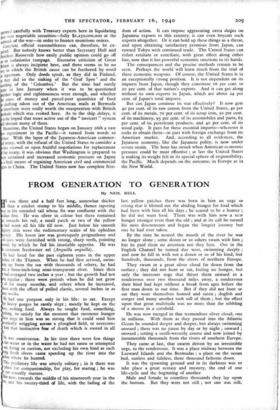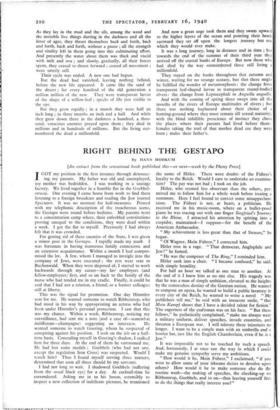FROM GENERATION TO GENERATION
By NEIL BELL
E was three and a half feet long, somewhat thicker than a cricket stump to his middle, thence tapering y to his rounded tail whose fin was confluent with the an fins. He was silver in colour but there remained t, towards his tail, a small patch or two of the yellow had worn all his life till now. Just below his smooth ppery skin were the rudimentary scales of his ophidian estry. His lower jaw was grotesquely prognathous and th jaws were furnished with strong, sharp teeth, pointing ard, by which he fed his insatiable appetite. He was common freshwater eel (Anguilla anguilla).
He had lived for the past eighteen years in the upper ches of the Thames. When he had first arrived, swim- up from the sea with thousands of others, he had a a three-inch-long semi-transparent elver. Since then had averaged two inches a year ; but the growth had not regular ; there were periods when he did not grow all for many months, and others when he increased, ost with the effect of pulled elastic, several inches in as y weeks.
lie had one purpose only in his life: to eat. Except heavy gorges he rarely slept ; mostly he kept on the ye, seeking food. Always he sought food, something, riling, to satisfy for the moment that ravenous hunger e urge in him was so strong that it could send him mieally wriggling across a ploughed field, or overcome him that instinctive fear of death which is rooted in all e.
He was omnivorous. In his time there were few things the water or in the water he had not eaten or attempted eat, living or carrion, not excluding his own kind as each g fresh elvers came speeding up the river into the hes where he hunted.
This predatory life was utterly solitary ; in it there was place for companionship, for play, for mating ; he was yet sexually mature. But now, towards the middle of his nineteenth year in the er, and his twenty-third of life, with the fading of the last yellow patches there was born in him an urge so strong that it blotted out the abiding hunger for food which had been with him all his days ; he ceased to be a hunter ; he did 'not want food. There was with him now a new hunger stronger even than the old ; and at its call he turned his nose downstream and began the longest journey but one he had ever taken.
By the time he neared the mouth of the river he was no longer alone ; some dozen or so others swam with him ; but he paid them no attention nor they him. Out in the English Channel he turned due west, swimming deeply ; and now he fell in with not a dozen or so of his kind, but hundreds, thousands, from the rivers of northern Europe.
They swam in a great silver cloud far down from the surface ; they did not hunt or eat, feeling no hunger, but only the incessant urge that thrust them onward to a rendezvous over two thousand miles away, a rendezvous their kind had kept without a break from ages before the first man down to our time. But if they did not hunt or eat they were themselves hunted and eaten ; dogfish and conger and many another took toll of them ; but the effect upon that great multitude was no more than the nibbling of a mouse in a cornfield.
He was now merged in that tremendous silver cloud, one in millions. With them as they passed into the Atlantic Ocean he sounded deeper and deeper, but always swimming onward ; there was no pause by day or by night ; onward ; ormard ; setting a south-westerly course and now joined by innumerable thousands from the rivers of southern Europe.
They came at last, that swarm driven by an irresistible urge, to the rendezvous. It was a place midway between the Leeward Islands and the Bermudas ; a place on the ocean bed, sunless and tideless, three thousand fathoms down.
It was the spawning ground and in its darkness was to take place a great ecstasy and mystery, the end of one life-cycle and the beginning of another.
Male and female in countless thousands they lay upon the bottom. But they were not still ; not one was still. As they lay in the mud and the silt, among the weed and the invisible live things darting in the darkness and all the litter of ages, they thrust themselves back and forth, back and forth, back and forth, without a pause ; all the strength and vitality left in them going into this culminating effort. And presently the water about them was thick and viscid with milt and ova ; and slowly, gradually, all their forces spent, they ceased to thrust forward ; ceased all movement ; were utterly still.
Their cycle was ended. A new one had begun.
But the dead had vanished, leaving nothing behind, before the new life appeared. It came like the sand of the desert ; for every hundred of the old generation a million million of the new. They were transparent larvae of the shape of a willow-leaf ; specks of life just visible to the eye.
But they grew rapidly ; in a month they were half an inch long ; in three months an inch and a half. And while they grew down there in the darkness a hundred, a thou- sand, voracious enemies preyed upon them ; they died in millions and in hundreds of millions. But the living out- numbered the dead a millionfold. And now a great urge took them and they swam upward to the higher layers of the ocean and pointing their heads eastward they set off upon the longest journey but one which they would ever make. It was a long journey, long in distance and in time ; but towards the end of the summer of their third year they arrived off the coastal banks of Europe. But now those who had died by the way outnumbered those still living a millionfold.
They stayed on the banks throughout that autumn and winter, waiting for no strange ecstasy, but that there might be fulfilled the wonder of metamorphosis: the change from transparent leaf-shaped larvae to transparent round-bodied elvers : the change from Leptocephali to Anguilla anguilla.
And with the coming of spring there swept into all the mouths of the rivers of Europe multitudes of elvers ; but there was nothing haphazard about their choice of a hunting-ground where they must remain till sexual maturity; with the blind infallible prescience of instinct they chose the places where their parents had lived before them: females taking the trail of that mother dead ere they were born ; males their father's.







































 Previous page
Previous page